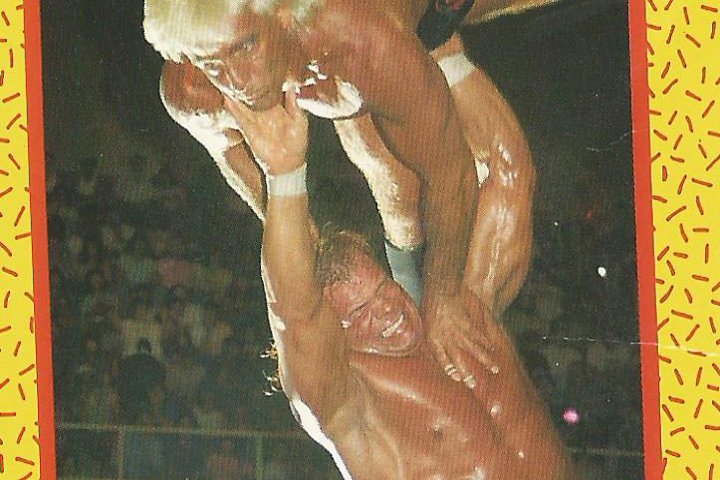It’s Day One of #LugerWeek, the eighteenth installment of our (patent-pending) Juice Make Sugar Wrestler of the Week series. As always, we’ll start by making Lex Luger a Wrestler You (Should) Probably Know Better.
Not since Ahmed Johnson has there been a Wrestler of Week so … undeserving isn’t the right word, because Lex was an integral part of the fabric of wrestling for a significant part of two decades, and more importantly thematically for this month, a Royal Rumble winner (1994) … but with such a questionable … aesthetic quality. Yeah, let’s go with that.
Luger is perhaps the ur-example of the difficulty with evaluating professional wrestling talent with any type of objectivity when it comes to things like accomplishments, crowd reaction and drawing power. Luger, for his part, played the role of Adonis (as in Greek God, not fat Adrian) as best as he could considering his, well, limited skill set. Even with all the pushes promoters gave him, including the nickname “The Total Package”, the “Lex Express” never quite got cranking on all cylinders, something that the WWE was oddly happy to drive home during their 50 Greatest Stars of the 90’s DVD collection.
Luger could (as the saying goes) walk, talk and chew gum at the same time. He was also not entirely lacking in charisma, and had such a good look that it allowed him to work a gimmick where he was obsessed with how good of a look he had and have it make total sense. But despite his most famous moniker, it never quite coalesced into anything significant. Especially not in New York, where history seemed to indicate his Warrior-without-the-baggage physique would lead him to the Promised Land, instead of the Promised Land-adjacent condo he ended up living in during his two-year-tenure with the company.
However, his inability to get over the way everyone had intended him to as a world-beating champion able to take on all comers had relatively little to do with any serious attitude problems (other than a penchant for not going above and beyond the call of duty when it came to his contract), dangerous in-ring technique or a chronic inability to stay healthy. It’s just that he never ended up being as “good” as the people booking him thought he was going to be, and definitely never as over with the crowd as he needed to be to justify the spots where companies would try to position him.
Part of it was timing. Like his extremely successful first run in the JCP era of WCW, where he became the longest reigning United States champion in history (523 days), and had a well-received on-and-off feud with Ric Flair for the NWA Heavyweight Championship that lasted for years following his split from the Four Horsemen. And it stayed hot, until his road to the feud’s ultimate reward — a clean victory over the Nature Boy for the title — hit a detour when Flair left the company following a dispute with then-president Jim Herd right before their blowoff match was to occur at the 1991 Great American Bash.
The make-up match at the same PPV with a capable though ultimately underwhelming Barry Windham would see him finally get his run with the big belt, but lose all of the momentum he had going into the match with an idiotic heel turn at the behest of Harley Race and Mr. Hughes. After having the wind taken out of his sails by the nonsensical turn, Luger would play out essentially play out the string on the rest of his contract. He shifted aimlessly from an abrasive feud with Ron Simmons to a brief pitstop with Rick Steiner at a Clash of the Champions in November of 1991 before sitting on the sidelines for months after fulfilling his contractual obligations, despite being the promotion’s World’s Champion, until he eventually lost cleanly to Sting at February 1992’s SuperBrawl II.
After managing to survive not just Vince McMahon’s failed wet dream, the WBF, but Bobby Heenan essentially propositioning him for sex on PPV — to be clear: the propositioning was on the PPV, not the sex — Luger found a reasonable bit of traction in the WWF as Hulk Hogan’s America-loving replacement following his body slamming of Yokozuna on the USS Intrepid in the lead-up to SummerSlam.
Unfortunately for Lex, as was the case with his feud with the Nature Boy, Luger never quite reached the brass ring as a baby face running up against Yoko’s “strong” run as a monster heel. He beat to the Hall of Famer via count-out at “The Biggest Event of the Summer” before getting screwed out of the title, like he had countless times during his programs with Flair, when he lost to him via disqualification at WrestleMania X following a dubious decision from special guest referee, Mr. Perfect.
That this happened the way it did as a result of Luger losing a popularity contest with Bret Hart following their “tie” at the 1994 Royal Rumble is an open secret in the world of wrestling. It also speaks to Luger’s impeccably bad luck with timing and inability to rise above cards he was dealt to ever truly become a main event player . Luger represented a specific type of worker, one that the WWF crowd had grown tired of with the relentless reign of the (to put it nicely) plodding Hulk Hogan and the influx of exciting new stars like Hart and Shawn Michaels. Unlike the generations before and after, however, looming issues with steroids and the physiques they create forced Vince to reevaluate whether pushing muscle bound performers like Luger was still a responsible business decision.
It wasn’t just timing that lead him to a career that was never close to bad, though. Even if it found itself flirting with disappointing and adequate much more than transcendence, Lex was simply best served as the second best man in a dominant tag team or one of the more prominent background players in a highly regarded stable. As evidenced by his runs with Sting, the Four Horsemen and the nWo, Luger was “good” at most things, but only really touched borderline greatness with his look. Which why he will serve — along with Ahmed — as a reminder that while, as we said last week, that ultimately being The Man requires not just the ability to look like and defeat him, you just have be able to make everyone else look just a little bit less like him than you.
For all his accomplishments, he was only able to do so for brief instances like his five-day WCW title reign in August of 1997. And it’s that run that perhaps best exemplifies the “trouble” with Luger: a toy that shiny quickly starts to lose its luster when you realize that the shine is all that it really has going for it.Which is why, even as a five-time US, three-time Tag Team and two-time TV/World’s Champion, it’s no surprise he still hasn’t found his way into the WWE’s Hall of Fame (and it’s not just because they all happened in WCW.)
With the resume he has, Lex would have long ago been enshrined in any type of hall that was entirely based on merit and accomplishments. Instead, he had a career was spent in a never ending shittwister of poorly conceived storylines, gimmick changes and turns, and the unfortunate role as the avatar for a very specific time in the industry that the company isn’t exactly keen on reliving. It was a time where the pressures of national television exposure led many a promoter down silly paths of heel turns and hotshotting angles in an attempt to grab ratings with guys who were never going to be what they told us they were, even if they look like they were going to be.
And while it’s not necessarily Lex Luger’s fault that he never lived up to the hype of what expected of him because of the era he came up in, he’s certainly taking the blame.




So basically a week full of some of the worst looking clotheslines seen in the history of the wrestling business.
We give the people what the want.
Oh im not hating on it, just stating fact. Im all ready to jump on to the Lex Express
Well, then you should get really excited for tomorrow’s Essential Viewing. I’ll make sure Dave finds some especially enjoyable botched clotheslines just for you.
NFL injured reserve legend Larry Pfohl.
Matthew Timmons liked this on Facebook.
Tom Keiser liked this on Facebook.
Making the best of a motorcycle crash and a steel plate!
Live the gimmick!
ICYMI, it’s #LexLugerWeek at JMS!
Better Know w/@THEN1CKSTER: http://t.co/0puY97Sj3S
Essential Viewing avec moi: http://t.co/io54aDDR0G